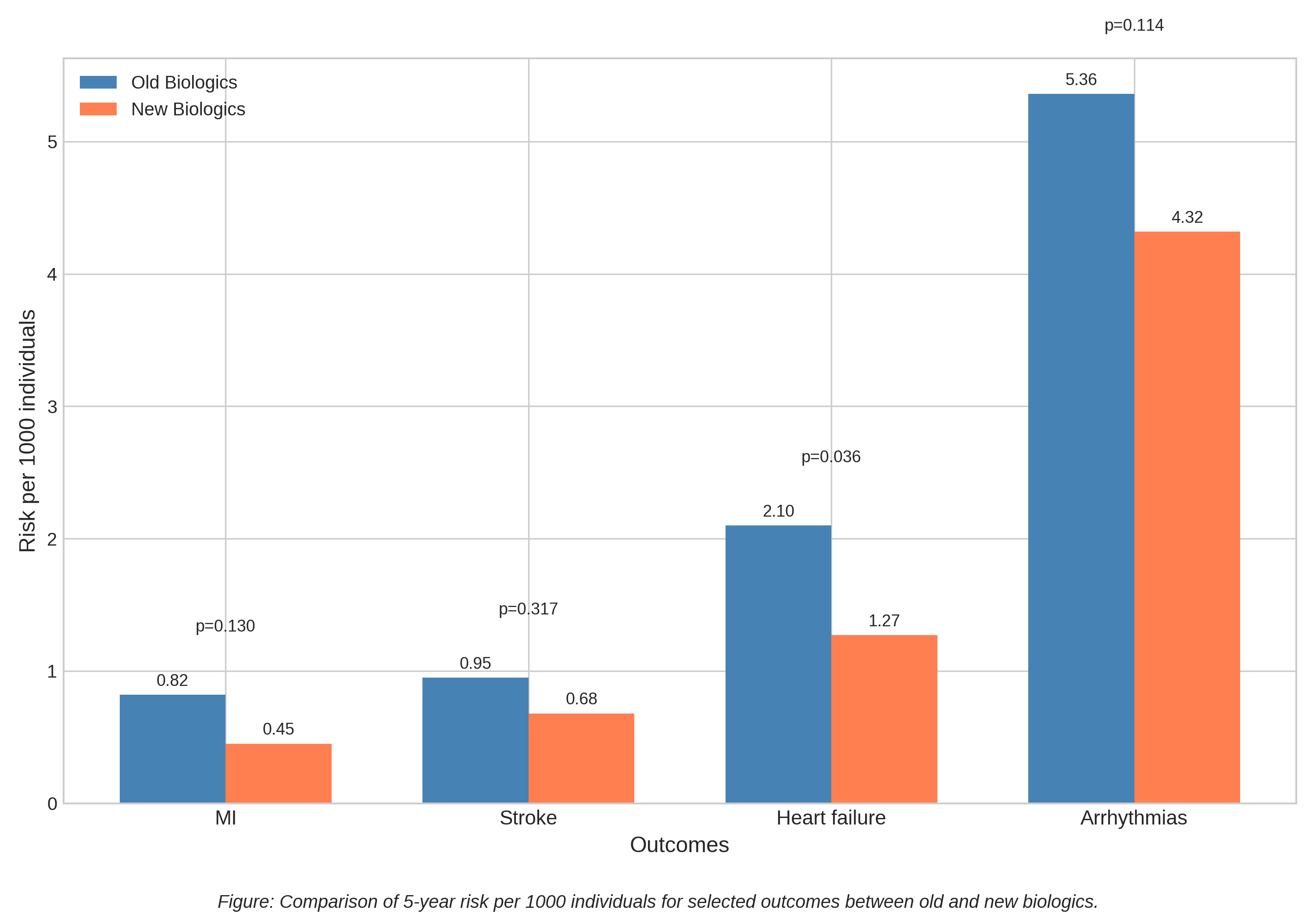Monday Poster Session
Category: IBD
P3303 - Real-World Comparison of Cardiovascular Safety: Old versus New Biologics in Inflammatory Bowel Disease Over 5 Years
Monday, October 27, 2025
10:30 AM - 4:00 PM PDT
Location: Exhibit Hall

Omar Arman, MD, MPH
University at Buffalo
Depew, NY
Presenting Author(s)
Omar Arman, MD, MPH1, Kamal Hamad, MD2, Khaled Rafeh, MD3, Ameera Elqasass, MD4, Ahmad Younis, MD5, Nadera Altork, MD6, Amer Arman, MD7, Mazen Zamzam, BS8, Jad Bou-Abdallah, MD1
1University at Buffalo, Buffalo, NY; 2Jordan University of Science and Technology, Irbid, Irbid, Jordan; 3School of Medicine, The University of Jordan, Shmeisani, 'Amman, Jordan; 4University of Jordan, Amman, 'Amman, Jordan; 5Cleveland Clinic, Cleveland, OH; 6MedStar Washington Hospital Center, Washington, DC; 7MedStar Health, Washington, WA; 8Oakland University William Beaumont School of Medicine, Royal Oak, MI
Introduction: Patients with inflammatory bowel disease (IBD) face an elevated risk of cardiovascular complications due to systemic inflammation and treatment side effects. Biologic therapies, including anti-TNF agents and newer agents targeting integrins or IL-12/23 pathways, are critical for managing moderate-to-severe IBD, but their comparative cardiovascular safety remains underexplored. Using real-world data, we evaluated the risks of myocardial infarction (MI), stroke, heart failure, and arrhythmias in patients treated with old versus new biologics over five years to provide insights into their safety profiles.
Methods:
We conducted a retrospective cohort analysis using the TriNetX global health research network, including adult IBD patients treated with biologics between 2015 and 2023. Patients with prior cardiovascular conditions were excluded. Propensity score matching balanced demographics, comorbidities, and disease severity (n = 22,009 each). Cardiovascular outcomes were identified using ICD-10 codes and assessed at 1, 3, and 5 years. Kaplan-Meier survival analysis, risk differences, risk ratios (RR), odds ratios (OR), and hazard ratios (HR) were calculated to compare groups.
Results: MI and stroke risks were comparable between old and new biologics at all time points (p > 0.05). Heart failure risk was consistently lower in the new biologics group at 1, 3, and 5 years, with heart failure-free probabilities of 99.94%, 99.82%, and 99.77%, respectively, compared to 99.88%, 99.73%, and 99.62% for old biologics (p < 0.05 for all time points). Arrhythmia risk was significantly reduced at 1 year (p = 0.003) but showed no significant difference at 3 years (p = 0.076) or 5 years (p = 0.114).
Discussion: Our study demonstrates that newer biologics significantly lower cardiovascular risks, particularly heart failure, compared to older biologics in IBD management. The reduced risk of arrhythmias at 1 year highlights their potential for short-term cardiovascular benefits. By leveraging real-world data, we provide a comprehensive evaluation of cardiovascular safety that reflects everyday clinical practice. These findings emphasize the critical role of cardiovascular safety in biologic selection, improving long-term outcomes especially for high-risk IBD patients. Future prospective studies should validate these findings across diverse populations and explore mechanisms driving the observed benefits of newer biologics.

Figure: Table 1: Cardiovascular risks in IBD patients treated with old vs. new biologics at 1, 3, and 5 years.

Figure: Figure 1: Comparison of 5-year risk per 1000 individuals for myocardial infarction (MI), stroke, heart failure, and arrhythmias between patients treated with old biologics and new biologics.
Disclosures:
Omar Arman indicated no relevant financial relationships.
Kamal Hamad indicated no relevant financial relationships.
Khaled Rafeh indicated no relevant financial relationships.
Ameera Elqasass indicated no relevant financial relationships.
Ahmad Younis indicated no relevant financial relationships.
Nadera Altork indicated no relevant financial relationships.
Amer Arman indicated no relevant financial relationships.
Mazen Zamzam indicated no relevant financial relationships.
Jad Bou-Abdallah indicated no relevant financial relationships.
Omar Arman, MD, MPH1, Kamal Hamad, MD2, Khaled Rafeh, MD3, Ameera Elqasass, MD4, Ahmad Younis, MD5, Nadera Altork, MD6, Amer Arman, MD7, Mazen Zamzam, BS8, Jad Bou-Abdallah, MD1. P3303 - Real-World Comparison of Cardiovascular Safety: Old versus New Biologics in Inflammatory Bowel Disease Over 5 Years, ACG 2025 Annual Scientific Meeting Abstracts. Phoenix, AZ: American College of Gastroenterology.
1University at Buffalo, Buffalo, NY; 2Jordan University of Science and Technology, Irbid, Irbid, Jordan; 3School of Medicine, The University of Jordan, Shmeisani, 'Amman, Jordan; 4University of Jordan, Amman, 'Amman, Jordan; 5Cleveland Clinic, Cleveland, OH; 6MedStar Washington Hospital Center, Washington, DC; 7MedStar Health, Washington, WA; 8Oakland University William Beaumont School of Medicine, Royal Oak, MI
Introduction: Patients with inflammatory bowel disease (IBD) face an elevated risk of cardiovascular complications due to systemic inflammation and treatment side effects. Biologic therapies, including anti-TNF agents and newer agents targeting integrins or IL-12/23 pathways, are critical for managing moderate-to-severe IBD, but their comparative cardiovascular safety remains underexplored. Using real-world data, we evaluated the risks of myocardial infarction (MI), stroke, heart failure, and arrhythmias in patients treated with old versus new biologics over five years to provide insights into their safety profiles.
Methods:
We conducted a retrospective cohort analysis using the TriNetX global health research network, including adult IBD patients treated with biologics between 2015 and 2023. Patients with prior cardiovascular conditions were excluded. Propensity score matching balanced demographics, comorbidities, and disease severity (n = 22,009 each). Cardiovascular outcomes were identified using ICD-10 codes and assessed at 1, 3, and 5 years. Kaplan-Meier survival analysis, risk differences, risk ratios (RR), odds ratios (OR), and hazard ratios (HR) were calculated to compare groups.
Results: MI and stroke risks were comparable between old and new biologics at all time points (p > 0.05). Heart failure risk was consistently lower in the new biologics group at 1, 3, and 5 years, with heart failure-free probabilities of 99.94%, 99.82%, and 99.77%, respectively, compared to 99.88%, 99.73%, and 99.62% for old biologics (p < 0.05 for all time points). Arrhythmia risk was significantly reduced at 1 year (p = 0.003) but showed no significant difference at 3 years (p = 0.076) or 5 years (p = 0.114).
Discussion: Our study demonstrates that newer biologics significantly lower cardiovascular risks, particularly heart failure, compared to older biologics in IBD management. The reduced risk of arrhythmias at 1 year highlights their potential for short-term cardiovascular benefits. By leveraging real-world data, we provide a comprehensive evaluation of cardiovascular safety that reflects everyday clinical practice. These findings emphasize the critical role of cardiovascular safety in biologic selection, improving long-term outcomes especially for high-risk IBD patients. Future prospective studies should validate these findings across diverse populations and explore mechanisms driving the observed benefits of newer biologics.

Figure: Table 1: Cardiovascular risks in IBD patients treated with old vs. new biologics at 1, 3, and 5 years.

Figure: Figure 1: Comparison of 5-year risk per 1000 individuals for myocardial infarction (MI), stroke, heart failure, and arrhythmias between patients treated with old biologics and new biologics.
Disclosures:
Omar Arman indicated no relevant financial relationships.
Kamal Hamad indicated no relevant financial relationships.
Khaled Rafeh indicated no relevant financial relationships.
Ameera Elqasass indicated no relevant financial relationships.
Ahmad Younis indicated no relevant financial relationships.
Nadera Altork indicated no relevant financial relationships.
Amer Arman indicated no relevant financial relationships.
Mazen Zamzam indicated no relevant financial relationships.
Jad Bou-Abdallah indicated no relevant financial relationships.
Omar Arman, MD, MPH1, Kamal Hamad, MD2, Khaled Rafeh, MD3, Ameera Elqasass, MD4, Ahmad Younis, MD5, Nadera Altork, MD6, Amer Arman, MD7, Mazen Zamzam, BS8, Jad Bou-Abdallah, MD1. P3303 - Real-World Comparison of Cardiovascular Safety: Old versus New Biologics in Inflammatory Bowel Disease Over 5 Years, ACG 2025 Annual Scientific Meeting Abstracts. Phoenix, AZ: American College of Gastroenterology.
